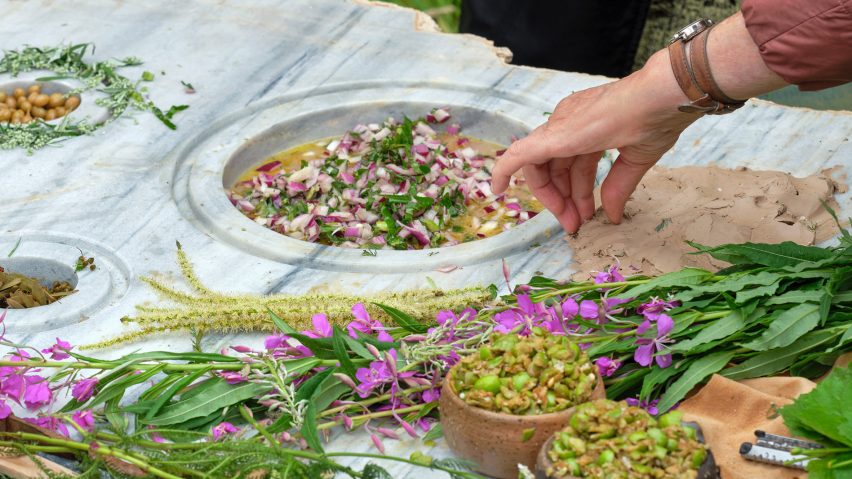Meals are prepared in a woodland kitchen using fermentation, rather than electricity or gas, in an installation by architect Andrés Jaque's Office for Political Innovation.
Jaque and his New York and Madrid-based studio designed the Transspecies Kitchen, made from marble offcuts, to demonstrate zero-carbon methods of preparing food.
The kitchen is now in action on the tree-filled grounds of the Middleheim Museum in Antwerp, Belgium, where it is hosting live cooking demonstrations.
Its design facilitates both bacteria- and fungi-based fermentation processes, allowing grown and foraged ingredients to be turned into various dishes.
Blocks of various marble types feature hollows in different shapes, creating areas where food can be prepared and served.
Each block is assigned a different food type, with kombucha, pickles and kefir among those incorporated.
The name, Transspecies Kitchen, refers to the living organisms involved in the fermentation processes.
"The Transspecies Kitchen dilutes the boundaries between kitchening, eating and decomposing, which comprise a continuum of molecular progression," said Jaque.
"It is a kitchen that decarbonises cooking and relies on fermentation as the primary form of food preparation."
The carbon-free approach extends to the marble blocks that the kitchen is made from.
Office for Political Innovation worked with stone fabricators M-Marble Project to make the kitchen, using marble discarded after quarrying because it didn't meet quality standards.
"Only 30 per cent of stones extracted in quarries is industrially used; the rest is immediately converted to waste," said Jaque.
"The Transspecies Kitchen challenges industry's waste-making, by recirculating and activating the material value to what was previously disposed of," he continued.
"Stones are barely transformed to become part of the Transspecies Kitchen. No other materials than the stone itself are added."
Office for Political Innovation first created the Transspecies Kitchen for the Tallinn Architecture Biennale in 2022, which centred around the future relationship between architecture and food.
The installation opened at the Middleheim Museum in July 2024, where it will remain all summer, allowing it to be put into regular use for the first time.
Jaque hopes to demonstrate how relationships between humans and other organisms can positively impact local ecosystems, in terms of both environment and politics.
He coined the name Antwerphagia, "the act of eating and being eaten by/as Antwerp's ecosystems", to describe the experiment.
"At the moment when toxicity in the soil and climate crisis shape Flanders' politics, the Antwerphagia is intended to provide alternative transspecies alliances based on mutual care," he said.
"These alliances are humanly sensed as taste, smell, intoxication, euphoria, sleepiness, drowsiness, dyspepsia, being high, flatulence, diarrhoea, heartburn, acidity and intolerance."
The work of Office for Political Innovation often oscillates between architectural design and concept-led installations.
On the architectural side, the studio's recent buildings include the experimental Reggio School and the biodiversity-focused Rambla Climate-House, both in Spain.
This project follows a series of other forays into "the architecture of eating processes".
Others include Run, Run, Run, an "urban techno-farm", and 1 Liter Oil Banquet, an installation that used food to reveal everyday energy use.
The photography is by José Hevia.
Transspecies Kitchen will be on show at Middleheim Museum throughout the summer. See Dezeen Events Guide for an up-to-date list of architecture and design events taking place around the world.

